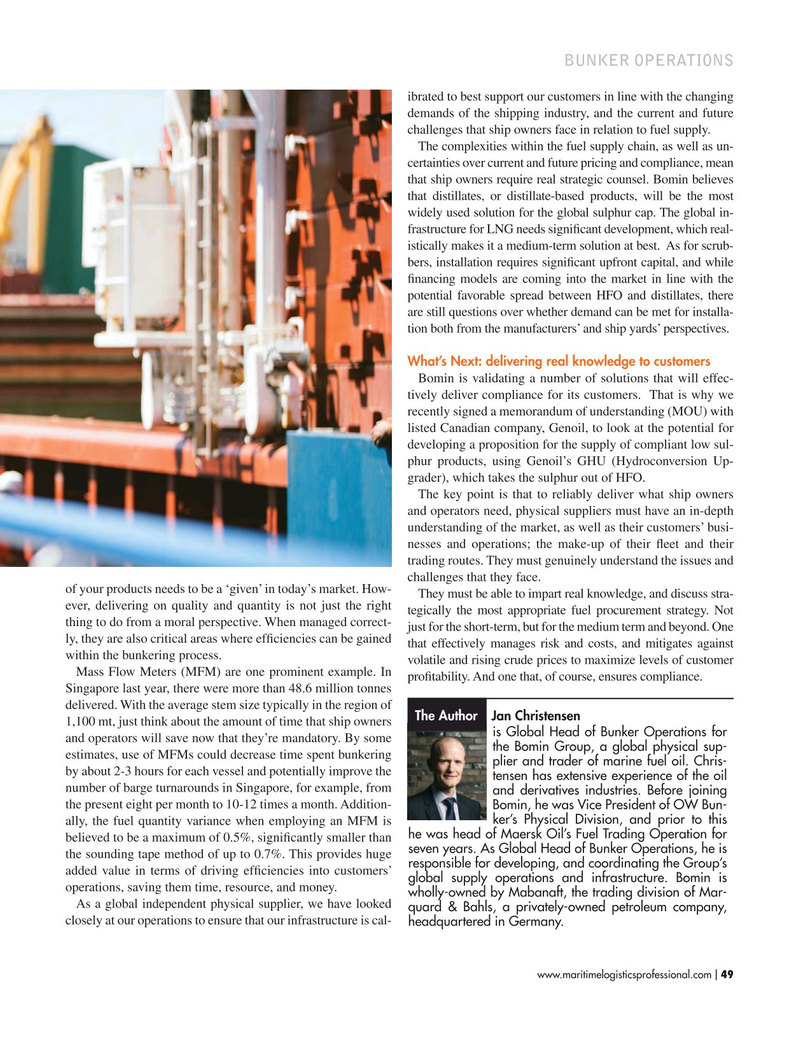
Page 49: of Maritime Logistics Professional Magazine (May/Jun 2017)
BUNKER OPERATIONS & PORTS
Read this page in Pdf, Flash or Html5 edition of May/Jun 2017 Maritime Logistics Professional Magazine
BUNKER OPERATIONS ibrated to best support our customers in line with the changing demands of the shipping industry, and the current and future challenges that ship owners face in relation to fuel supply.
The complexities within the fuel supply chain, as well as un- certainties over current and future pricing and compliance, mean that ship owners require real strategic counsel. Bomin believes that distillates, or distillate-based products, will be the most widely used solution for the global sulphur cap. The global in- frastructure for LNG needs signifcant development, which real- istically makes it a medium-term solution at best. As for scrub- bers, installation requires signifcant upfront capital, and while fnancing models are coming into the market in line with the potential favorable spread between HFO and distillates, there are still questions over whether demand can be met for installa- tion both from the manufacturers’ and ship yards’ perspectives.
What’s Next: delivering real knowledge to customers
Bomin is validating a number of solutions that will effec- tively deliver compliance for its customers. That is why we recently signed a memorandum of understanding (MOU) with listed Canadian company, Genoil, to look at the potential for developing a proposition for the supply of compliant low sul- phur products, using Genoil’s GHU (Hydroconversion Up- grader), which takes the sulphur out of HFO.
The key point is that to reliably deliver what ship owners and operators need, physical suppliers must have an in-depth understanding of the market, as well as their customers’ busi- nesses and operations; the make-up of their feet and their trading routes. They must genuinely understand the issues and challenges that they face.
of your products needs to be a ‘given’ in today’s market. How-
They must be able to impart real knowledge, and discuss stra- ever, delivering on quality and quantity is not just the right tegically the most appropriate fuel procurement strategy. Not thing to do from a moral perspective. When managed correct- just for the short-term, but for the medium term and beyond. One ly, they are also critical areas where effciencies can be gained that effectively manages risk and costs, and mitigates against within the bunkering process. volatile and rising crude prices to maximize levels of customer
Mass Flow Meters (MFM) are one prominent example. In proftability. And one that, of course, ensures compliance.
Singapore last year, there were more than 48.6 million tonnes delivered. With the average stem size typically in the region of
The Author Jan Christensen 1,100 mt, just think about the amount of time that ship owners is Global Head of Bunker Operations for and operators will save now that they’re mandatory. By some the Bomin Group, a global physical sup- estimates, use of MFMs could decrease time spent bunkering plier and trader of marine fuel oil. Chris- by about 2-3 hours for each vessel and potentially improve the tensen has extensive experience of the oil number of barge turnarounds in Singapore, for example, from and derivatives industries. Before joining the present eight per month to 10-12 times a month. Addition- Bomin, he was Vice President of OW Bun- ally, the fuel quantity variance when employing an MFM is ker’s Physical Division, and prior to this he was head of Maersk Oil’s Fuel Trading Operation for believed to be a maximum of 0.5%, signifcantly smaller than seven years. As Global Head of Bunker Operations, he is the sounding tape method of up to 0.7%. This provides huge responsible for developing, and coordinating the Group’s added value in terms of driving effciencies into customers’ global supply operations and infrastructure. Bomin is operations, saving them time, resource, and money.
wholly-owned by Mabanaft, the trading division of Mar-
As a global independent physical supplier, we have looked quard & Bahls, a privately-owned petroleum company, closely at our operations to ensure that our infrastructure is cal- headquartered in Germany.
www.maritimelogisticsprofessional.com 49
I

 48
48

 50
50
